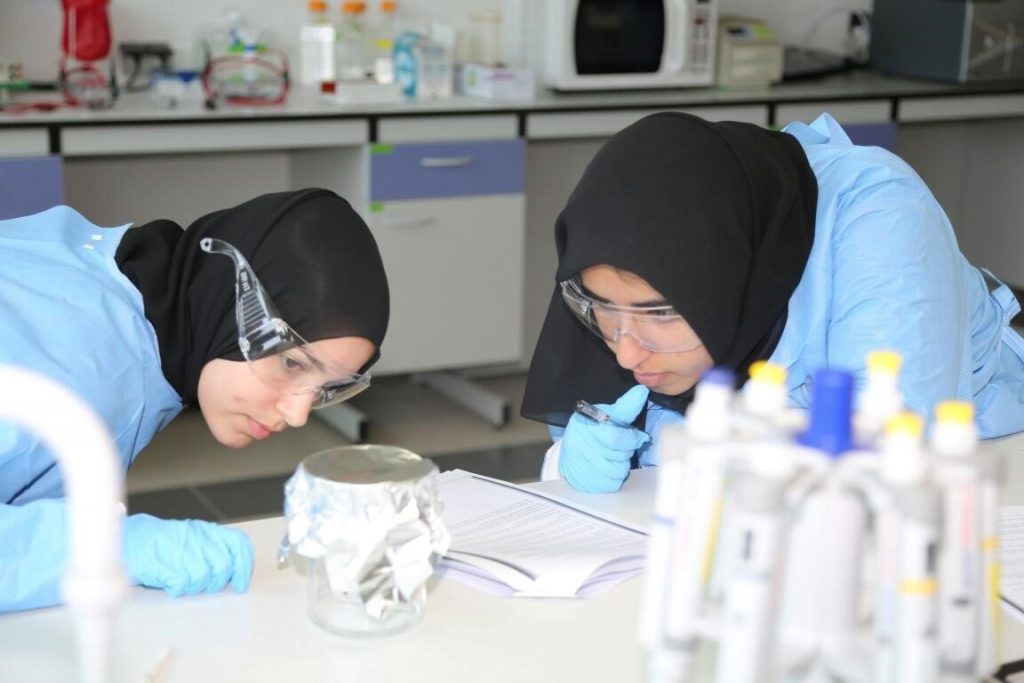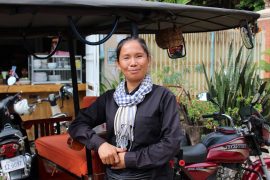Despite recent advancements in the Middle East, women remain massively under-represented in the fields of science and engineering across the region and more must be done to change this, say experts.
According to the 2021 UNESCO Science Report, only 33 percent of researchers worldwide are women. While gender parity has almost been achieved in the Middle East and North Africa region at the doctorate level and the start of a scientific career, there are still considerable disparities across disciplines and between countries.
The glass ceiling remains a reality for females involved in research, where the proportion of women decreases as they advance in their careers, in all likelihood because of obstacles and barriers. Although the Gulf region is blazing a trail for women, there is still a long way to go given that they constitute only 40 percent of the STEM workforce.
Nura Adam Mohammed, from Qatar University, believes that changing this imbalance requires collaboration among many groups, organizations and parts of society, including families, schools, universities and governments.
“Empowering women in science should start at the very early stages, as early as primary schools, and by hosting public engagements and welcoming young girls to research open days and later to volunteer in the research field,” she said.
Her work involves the development of non-conventional therapeutic tools to prevent diabetes and cardiovascular diseases, which could help solve one of the region’s biggest health challenges.
Mohammed was one of 14 Arab women honoured last month at L’Oréal-UNESCO For Women in Science Middle East, a special event hosted by Expo 2020 Dubai in recognition of the work of exceptional women in the fields of life sciences, physical sciences, mathematics and computer science.
The project is part of a global initiative that since its inception in 1998, has recognized more than 3,900 researchers and 122 laureates from more than 110 countries and regions.
Another of those recognized this year was Ghada Dushaq from New York University Abu Dhabi, one of five women from the Gulf Cooperation Council area honored at the event.
She said she hopes to inspire a new generation of Arab women to take up science, a sector in which they remain under-represented, and is specifically interested in the fields of photonics and optics where the proportion is below average.
“Innovative and ground-breaking scientific ideas require the talents of both women and men,” she said. “Achieving gender equality in science will create a balanced and holistic approach to leadership and better-educated children in future generations.”
Mushtaq was recognized for her post-doctoral research on novel materials and structures in photonics to enhance conventional technologies’ speed, capacity, and accuracy. She said such research has the potential to influence and even revolutionize, other sectors such as health, space, mobility and security.
Arij Yehya, also from Qatar University and honored at the event, said that she believes more must be done to encourage women to pursue a career in science as the benefits of their work can extend far beyond the scientific community.
“Women have important social roles, such as being caregivers,” she said. “Having more women working in the field of science can provide an impact on the community through their social roles, and women in science can pave the way for a more prosperous society.”
Yehya’s research focuses on identifying factors that drive the widening gender gap in personality traits to further evaluate current and future gender policies.
Investigative work of this nature is complex and requires a rigorous scientific approach. Still, most work on the subject comes from other parts of the world, and it is time to bridge this gap in the region, she said, referring to the discovery of links between personality and culture.
With women now accounting for half of all engineers in the UAE, Halima Alnaqbi, an academic at Khalifa University, added that the field of science is changing in the country, the barriers that once stood in the way of women have been removed and the image of the sector as a male-dominated domain is outdated.
“The stereotype that working in science, and especially engineering, is only for men is changing,” Alnaqbi said. “In science, research is done in teams, and gender and specialization diversity in any group is particularly important since it encourages innovation.
“Women have previously demonstrated their ability in science topics, as more than half of engineering graduates in the UAE are female.”
Hend Alqaderi, from Kuwait and a lecturer at Harvard School of Dental Medicine, also believes that it is crucial to engage more women in science. Her personal experiences during the pandemic only helped to reinforce her opinion.
“Having more women in scientific research can bring diversity and make research more effective and accurate, impacting both men and women,” she said.





Comments are closed.